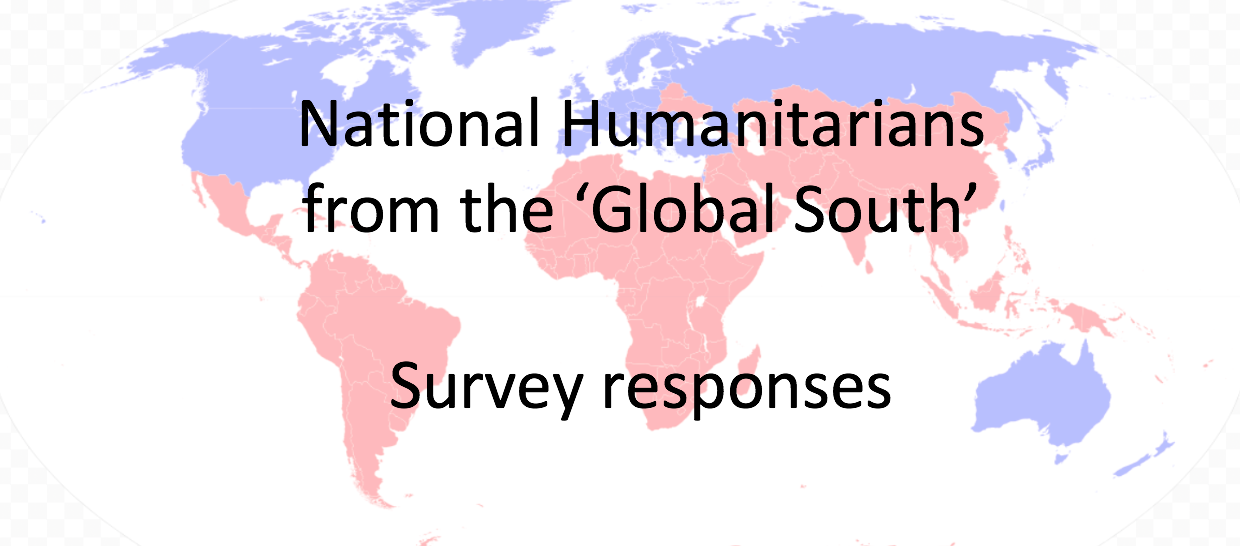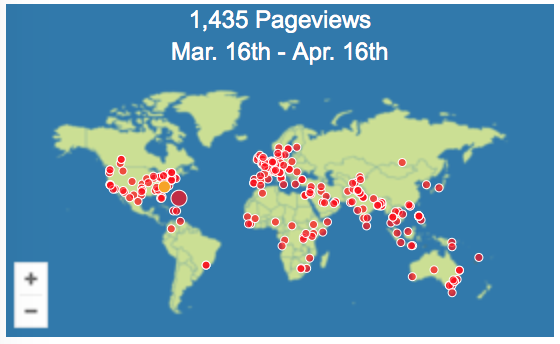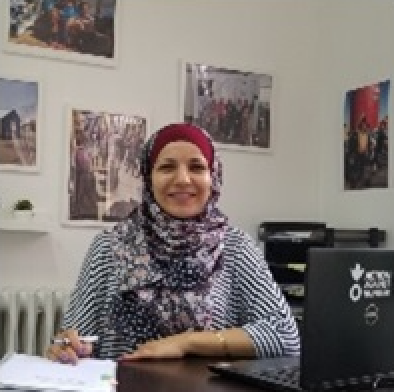Research update: Humanitarians from the ‘global South’
[Note: If you are a national (local) humanitarian aid or development worker from the ‘global South and have not done so already, please take the time to have your voice heard by taking our survey. Click here for links to all versions.]
Update: Nice surge in responses, total now at 156
Overview
Our survey targeting humanitarian aid and development workers has been open since mid February, and to date has 139 responses from 22 different nations. Respondents are from Bangladesh (Cox’s Bazar), Sri Lanka, Cambodia, Panama, Venezuela, Argentina, Ethiopia, Kenya, Sudan, South Sudan, Nigeria, Mali, Burundi,  Somalia, Jordan, Lebanon, Syria, Iraq, and, all the way from the South Pacific, comes one respondent from Vanuatu. Representation from Ethiopia and Iraq is very strong, each having 44 respondents just now, largely due to the effective networking efforts of Samuel Lemma Kibret in Ethiopia and Hero Anwar Brzw in Iraq.
Somalia, Jordan, Lebanon, Syria, Iraq, and, all the way from the South Pacific, comes one respondent from Vanuatu. Representation from Ethiopia and Iraq is very strong, each having 44 respondents just now, largely due to the effective networking efforts of Samuel Lemma Kibret in Ethiopia and Hero Anwar Brzw in Iraq.
The English language ‘long’ version has 55 respondents, while the English ‘short’ version has 65. The Arabic versions have 14 total, with 6 completing the short version and 8 from the long. The two French versions have a total of 3 hits and the Bangla versions have 2.
As you can see to the on this map, our research blog has been has visitors from across the globe, many from the so-called ‘global South.’ Indeed, this is where many have been accessing the survey.
from the so-called ‘global South.’ Indeed, this is where many have been accessing the survey.
More on the ‘research team’
Numerous humanitarians have had a part in constructing the survey questions, translating the survey, spreading the word to others in their home nation and beyond encouraging participation, and in general providing support, feedback, mentoring, and colleagueship. This research has truly been a collaborative effort. In an earlier post I introduced members of the ‘research team‘, and these numbers continue to rise. To date there are twenty men and woman from eleven nations who have joined me in this effort to hear, amplify, and report the voices of humanitarian workers across the globe.
New additions include Nooralhuda F. Saleh, currently a Graduate Research Assistant in the Department of Civil, Construction, and Environmental Engineering at North Carolina State University. From Lebanon, Noor is here in the US working on her graduate degree in civil engineering. Her contribution to the project is critical, and I will soon be honored to share the fruits of her labor. She is now constructing the data base framework for all survey responses. This is a big project given that there are 8 versions of the survey (four language versions each with a ‘short’ and ‘long’ form), and blending all that data together would be impossible without proper data management.
A second addition to the team is Amnah Samara, the HR Manager at Action Against Hunger in  Amman, Jordan. Amnah is also the team leader of the HR cluster group in Amman, and will be reaching out to personal contacts to spread the word of the survey. In our recent conversation she agreed wholeheartedly on two main points. First, she expressed full support for the survey and agreed that getting more voices could lead to “national humanitarians finally being heard.” A second point of strong agreement was that a strength of the survey is the fact it is totally independent of any organization within the humanitarian ecosystem. Respondents can know that no national or international organization nor any government or government Ministry has any control over the data or how it is used.
Amman, Jordan. Amnah is also the team leader of the HR cluster group in Amman, and will be reaching out to personal contacts to spread the word of the survey. In our recent conversation she agreed wholeheartedly on two main points. First, she expressed full support for the survey and agreed that getting more voices could lead to “national humanitarians finally being heard.” A second point of strong agreement was that a strength of the survey is the fact it is totally independent of any organization within the humanitarian ecosystem. Respondents can know that no national or international organization nor any government or government Ministry has any control over the data or how it is used.
How long will the survey remain live?
The process of reaching out to national humanitarians is labor intensive, involving face to face meetings, phone, Skype, and WhatsApp calls, and all manner of social media communication. There is no compelling reason to rush the process, so survey will remain open at least for the next several weeks and perhaps even longer. That said, we do want to pass along the message that it is urgent that as many voices as possible are heard as soon as possible.
In you have any questions about this research or want to know how you can help, please feel free to contact me.


 Follow
Follow